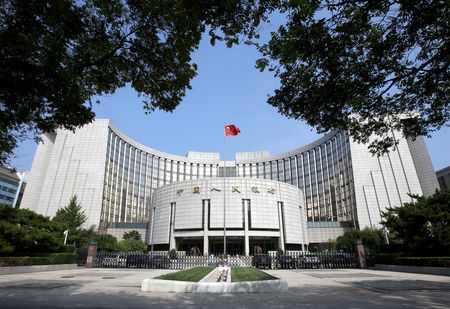SHANGHAI/SINGAPORE (Reuters) – China is expected to leave benchmark lending rates unchanged on Monday, while more market participants project further monetary easing to aid the economy following weaker-than-expected second-quarter economic data, a Reuters poll showed.
A fragile yuan, China’s lower interest rates versus other major economies, monetary policy divergence and narrowing interest margins at commercial banks remain the key constraints limiting Beijing’s easing efforts, market watchers said.
The loan prime rate (LPR), normally charged to banks’ best clients, is calculated each month after 20 designated commercial banks submit proposed rates to the People’s Bank of China (PBOC).
The survey of 36 market watchers found 23, or 64% of all respondents, expect the one-year and five-year LPRs to stay unchanged. This was lower than a 70% majority who picked a steady outcome in the LPR poll conducted last month.
Among the remaining 13 participants, four expected a steady one-year LPR but a reduction to the five-year rate, and the other nine respondents saw cuts to both tenors.
A pick-up in market expectations of further monetary easing comes after data showed that China’s economy slowed in the second quarter, as a protracted property downturn and job insecurity weighed on domestic demand, keeping alive expectations Beijing will need to unleash more stimulus.
“We continue to see no medium-term lending facility (MLF) rate cuts for the rest of 2024, but believe a 10-20 basis-point LPR cut is possible with the help of banks lowering deposit rates further,” Wang Tao, chief China economist at UBS, said.
China’s central bank kept the MLF rate unchanged as expected earlier this week when rolling over maturing medium-term loans.
PBOC Governor Pan Gongsheng told a forum last month that the central bank has continued to reform and improve the LPR mechanism to focus more on “improving the quality of LPR quotations to better reflect interest rate levels in the loan market.”
(Reporting by Li Hongwei and Winni Zhou in Shanghai, Tom Westbrook in Singapore; Editing by Jacqueline Wong)





